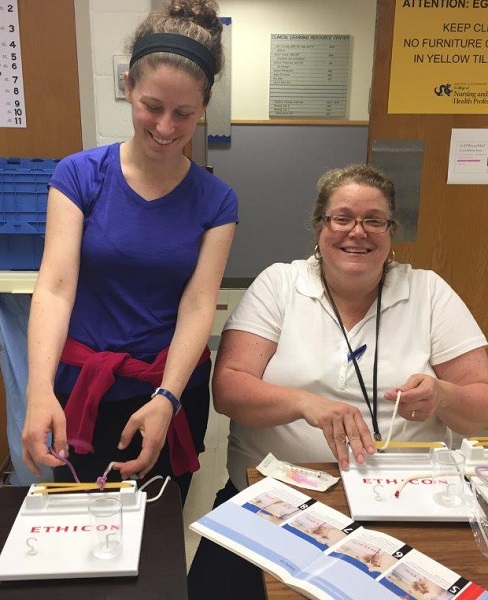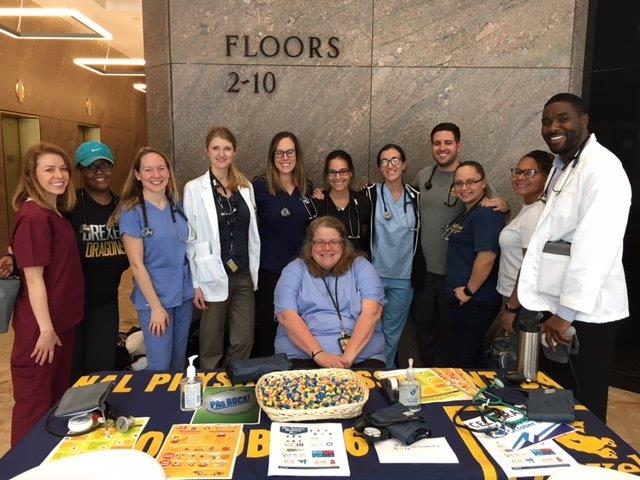Experience, Love and a Dedication to Students
October 30, 2017
 The College of Nursing and Health Professions has been educating physician assistants for 45 years, only five years less than the 50 years the profession has been in existence. Thirty years ago, Clare Pisoni decided to pursue an education at Hahnemann for a career as a physician assistant because of her father, a World War II veteran. “My father was stationed in the South Pacific in the medical corps which was actually how the PA profession started in the late 60s when people were returning from Vietnam,” shared Pisoni. “When I was in my 20s trying to figure out what the heck I wanted to do with my life then heard of this profession, I feel like it was really meant for me,” she added. Today, she has a unique distinction: Pisoni is an alumna of the same program in which she teaches. She received her bachelor’s degree from the physician assistant program in 1989 and became a clinical instructor at Drexel in 2014 and can easily speak to the evolution of the program.
The College of Nursing and Health Professions has been educating physician assistants for 45 years, only five years less than the 50 years the profession has been in existence. Thirty years ago, Clare Pisoni decided to pursue an education at Hahnemann for a career as a physician assistant because of her father, a World War II veteran. “My father was stationed in the South Pacific in the medical corps which was actually how the PA profession started in the late 60s when people were returning from Vietnam,” shared Pisoni. “When I was in my 20s trying to figure out what the heck I wanted to do with my life then heard of this profession, I feel like it was really meant for me,” she added. Today, she has a unique distinction: Pisoni is an alumna of the same program in which she teaches. She received her bachelor’s degree from the physician assistant program in 1989 and became a clinical instructor at Drexel in 2014 and can easily speak to the evolution of the program.
Pisoni, who’s been a practicing physician assistant for 28 years, feels like the growth in career opportunities and general awareness is partially due to studies published in 2003 that led to capping medical residents’ work week. “Cutting the hours for the residents put advanced practitioners in their roles, claimed Pisoni. “We're really taking the place of the residents because they can't stay there that long. And that's definitely been a big change—the field has opened up because of this moratorium on the residents' hours,” she added. Pisoni notes that while more people know about physician assistants, they don’t know how old the profession actually is or that, as a whole, what’s involved in their schooling.
PAs are broadly educated using a physician model. While they need to complete more than 2,000 hours of clinical rotations in family medicine, internal medicine, obstetrics and gynecology, pediatrics, general surgery, emergency medicine and psychiatry, some would argue that PAs are taught to seek or build more of a connection with their patients than doctors. It is often heard from people who receive their primary care from physician assistants how much time they spend together looking at them as a whole and that all their questions are answered. In fact, one of the first courses PAs take in CNHP is patient communication where students learn about patient-provider collaboration and counseling techniques for education and health promotion. Further into the program, CNHP’s PA students look at the biopsychosocial model of patient care. When one looks at the curriculum and pairs it with the mission of the program, it’s clear that serving patients and delivering quality healthcare, especially in underserved areas are at the heart of this program.
Pisoni, in her role as a clinical instructor, does students’ clinical assessment lab, ethics and clinical reasoning seminar. She also serves as the surgery clinical coordinator for the surgery rotation. “I make sure everybody’s doing okay on the rotation. I go see students and see how they do, but I'm also going to the preceptors and learning a little bit about them,” said Pisoni. One of the things that really impresses her about Drexel’s program is the diversity in students it attracts. She commented that she doesn’t see that as much in other PA programs. “We have people from Africa, people from Utah, some in their early 20s and some people that are already in the 50s,” she acknowledged. This is an important strength of the program because it encourages students learning from each other. They all have vastly different experiences to share whether it’s cultural, professional, communal or academic. Diversity isn’t restricted to students. CNHP’s faculty offers an exceptional mix of professional and medical knowledge. She made a point of mentioning the how available faculty advisors are for students. “I have an open-door policy with my advisees and cultivate a special connection with them. I want them to come to me anytime they need or want to talk,” she remarked. This sentiment is prevalent throughout.
coordinator for the surgery rotation. “I make sure everybody’s doing okay on the rotation. I go see students and see how they do, but I'm also going to the preceptors and learning a little bit about them,” said Pisoni. One of the things that really impresses her about Drexel’s program is the diversity in students it attracts. She commented that she doesn’t see that as much in other PA programs. “We have people from Africa, people from Utah, some in their early 20s and some people that are already in the 50s,” she acknowledged. This is an important strength of the program because it encourages students learning from each other. They all have vastly different experiences to share whether it’s cultural, professional, communal or academic. Diversity isn’t restricted to students. CNHP’s faculty offers an exceptional mix of professional and medical knowledge. She made a point of mentioning the how available faculty advisors are for students. “I have an open-door policy with my advisees and cultivate a special connection with them. I want them to come to me anytime they need or want to talk,” she remarked. This sentiment is prevalent throughout.
Another aspect Pisoni feels is an asset is its history. The mission of the program that co-founders Wilbur Oaks, MD and David Major, MD portends outstanding preparation of its students and improvement in healthcare delivery. Faculty achieve this through consistent and recurrent assessment. None of its constituents is comfortable with resting on their laurels. Courses are regularly evaluated to make sure they are still the best they could be—tweaked if found otherwise—and student reviews are taken seriously with the goal of improving the program.
Pisoni is an active member of both the Pennsylvania Society of Physician Assistants and the Physician Assistant Education Association. Her career speaks to the versatility of the profession. “I have worked in surgery, on the cardiac floor, in the ICU and I've worked in the outpatient arena,” she mentioned. “I say that our students do primary care, however, we do send them to surgery rotation because I think it's important they know what the signs and symptoms are of appendicitis. I went to see a patient on a site visit, and her preceptor said she diagnosed appendicitis in the office and then sent him to the emergency room,” she furthered. In addition to her position at Drexel, she lectures at Salus University and for Pennsylvania Society of Physician Assistants and also doing per diem work at a Hospital of the University of Pennsylvania where she does ICU medicine and procedures. Even with all this, she still has time to spend with her 16- and 19-year old children, read and check out the arts.
Things I like or would recommend:
Book: Anatomy of an Illness: As Perceived by the Patient by Norman Cousins
Pisoni thinks the point is to try to concentrate on the good things rather than bad things that are happening and try practicing mindfulness.
TV Show or Movie: I love The Walking Dead and I just binge-watched Ray Donovan which I think has a good cast of characters.
Written by Roberta S. Perry